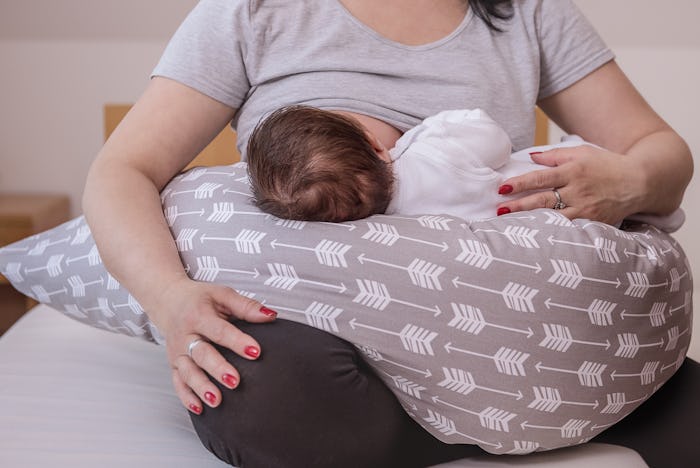I grew up surrounded by mothers who nursed, so I just knew that when I became a mom I would be breastfeeding. I never once questioned if breastfeeding would be right for me. Instead, I considered it to be the thing expected of me. Then I had my baby and quickly realized that the "natural" thing I was "supposed" to do was hurting me. Breastfeeding actually made my postpartum depression worse, proving that breast isn't always best after all.
It took a year for me to be properly diagnosed with postpartum depression, which means I spent a year being disconnected from my friends, my family, and my baby. I spent a year feeling ashamed, as if something was wrong with me, as I struggled to care for a newborn when I could barely take care of myself. By the time I reached out for help I felt as if my baby was a stranger, and was convinced my inability to breastfeed had created a distance between us that I was destined to endure for the rest of my life.
What I didn't know then is that if I had stopped trying and struggling and trying some more to breastfeed, I could have put my mental health first and, as a result, probably would have received a diagnosis sooner. If I had made myself a priority, I could have found myself healthy enough to fully focus on my baby and my new life as her mother. But, instead, I continued to try breastfeeding because it's what I thought I was supposed to do. So with that in mind, and because no woman should feel pressured to nurse and especially if it's a detriment to her health, here are a few ways nursing made my postpartum depression worse:
It Prevented Me From Bonding With My Baby
For many women, breastfeeding takes a serious toll on you physically, mentally, and emotionally — especially when you're a first-time mom. I had unrealistic expectations, a lot of internalized pressure, and no one to reach out to for help or guidance. I simply thought that if I tried hard enough to nurse, it would happen. And I thought that if I tried hard enough to be happy, my depression would simply lift.
You can't white-knuckle your way through postpartum depression, and you can't push past breastfeeding struggles without support and assistance. My depression made it harder for my baby to latch, impacted my milk supply, and kept me emotionally detached during feedings. And my breastfeeding struggles made me more depressed. It was a vicious cycle, and that cycle created a distance between myself and my baby.
It Made Me Resentful
I hated breastfeeding. I dreaded every single feeding, and when my daughter wasn't hungry I was anxious for the moment she would be. Every single feeding made me loath the entire experience, so before I knew it I was knee-deep in an always-present resentment that made me irritable and angry. It all just fed my depression, and pushed me deeper into a very, very dark place.
It Convinced Me My Baby Hated Me
After a while, it was hard not to take my breastfeeding struggles personal. Every time my daughter struggled to latch I felt as if she was somehow trying to hurt me. Every time she cried for a feeding I thought she was trying to drive me clinically insane. It wasn't logical, sure, but postpartum depression isn't logical. I was convinced that my baby hated me, and our breastfeeding struggles only made it worse.
It Was Another Obligation I Couldn't Handle
As a new mom I was under a lot of pressure to "do it all." I had to heal from childbirth, enjoy my baby, breastfeed, survive on little sleep, and all with a smile on my face. I was so focused on everything I thought I had to do, especially nursing, that I overlooked the things I really needed — like help, space, and self-care. Formula-feeding would have allowed someone else to step in for feedings so every single session wasn't my responsibility.
It Made Me Constantly Tired
Breastfeeding was incredibly demanding. I was constantly tired, and that fatigue only fed my postpartum depression. I never had time to rest or re-center or even get back to neutral. I felt too exhausted to do anything, including seeking the help I needed.
It Demonized Formula
After that first feeding I knew I wanted to switch to formula... I was just too terrified to say it out loud. All I have ever heard is "breast is best," and all I've ever seen was formula-feeding moms being shamed for being "selfish." There was a safe, healthy alternative a supermarket away -- one that would have allowed me to sleep and enjoy full bodily autonomy -- and I didn't use it because I was too afraid of what everyone else would think about me as a mother.
It Made Me Feel Alone
Every breastfeeding mom I knew was happy, and loved to nurse her baby. So I was isolated, and alone, and felt like I had no one to turn to, especially when I needed to talk about my feelings. That isolating kept me in my postpartum depression, unable to seek the help I needed and deserved. If I had listened to my intuition and done what was best for me, I wouldn't have been suffering alone... and in silence.
If you or someone you know is experiencing postpartum depression, contact the Postpartum Health Alliance toll-free at (888) 724-7240 or Postpartum Support International at (800) 944-4773. If you're experiencing an emergency contact the National Suicide Prevention Hotline at 1-800-273-8255 or dial 911.
